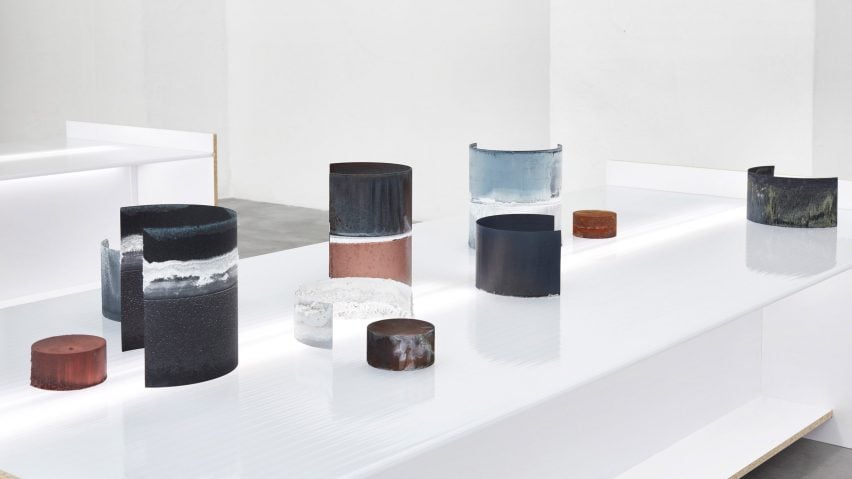Dutch designer Xandra van der Eijk has poured household chemicals onto widely available metal objects in an installation that aims to demonstrate how chemical waste dumping is affecting the earth in the anthropocene era.
Called Future Remnants, the installation is inspired by the anthropocene era – a term used to describe the period in which human impact has become the dominant force on the earth's geology.
The installation specifically explores the dumping of chemical waste, which is when substances that should be properly disposed of, instead end up in the landscape.
On show at Dutch Design Week, which ran from 20 to 28 October, the installation featured a series of steel, aluminium, zinc and copper objects that have been exposed to relatively low-chemical household solutions for periods of two to seven days.
"The Netherlands has quite a reputation for it: we are a major drug country, and what happens is that the waste is being dumped in backcountry and forests," van der Eijk told Dezeen.
"Trucks full of barrels with chemical substances are pulled off the truck with a rope, causing them to land with a bang, making them leak from the moment of dumping," she continued.
The objects feature a variety of patterns and colours with some exhibiting crystal formations. These are meant to represent, on a smaller scale, the impact of chemical waste dumping on the environment.
"Imagine what could happen with larger amounts, stronger concentrations and years or centuries to grow," said the designer.
"If such effects can be reached with chemicals considered relatively safe and harmless, what is already happening in the landscape and under the earth's surface as a result of a much larger-scale chemical waste dumping?" she continued.
When compiling research for her project, van der Eijk tested a series of regular building materials with low-solution chemicals readily available from the supermarket and hardware store.
She settled on four metals "that will be left behind on earth on a massive scale", and five solutions, such as drain cleaners, all purpose cleaners, tarnish removers and car battery fluid, and insect repellants, all from different brands and shops, which have similar active ingredients but varying formulas.
According to van der Eijk, the project aims to simply highlight the side effects of chemical waste dumping, rather than focusing wholly on the negative implications.
"It shows both the harm and potential. I don't want to take a side, per se, just demonstrate. The project looks at how we can't overlook our actions and the consequences that arise from them," she said.
Elsewhere at Dutch Design Week, the Design Invertuals exhibition displayed 10 objects that aim to question whether it is possible reduce the volume of non-essential products in our lives.

